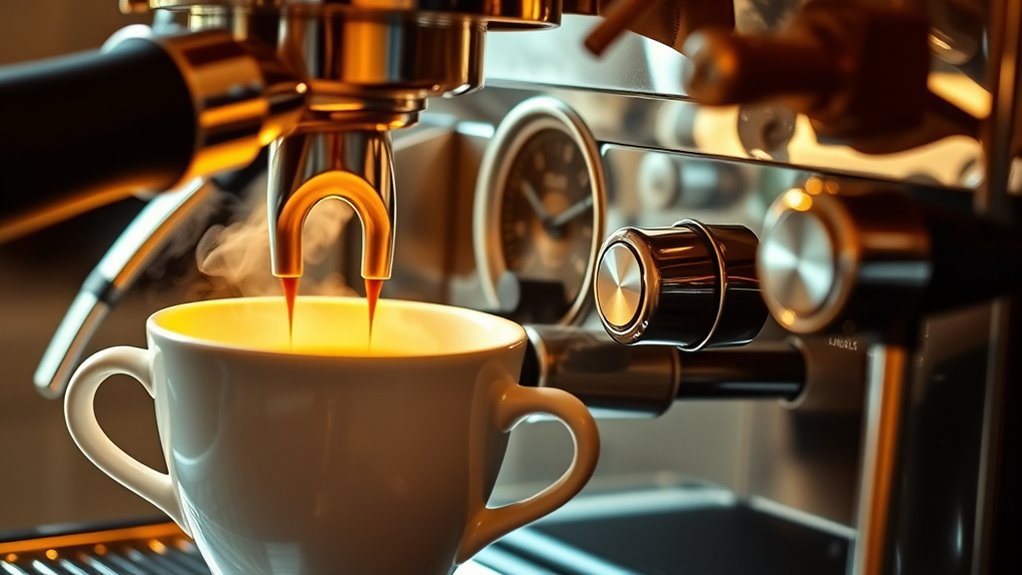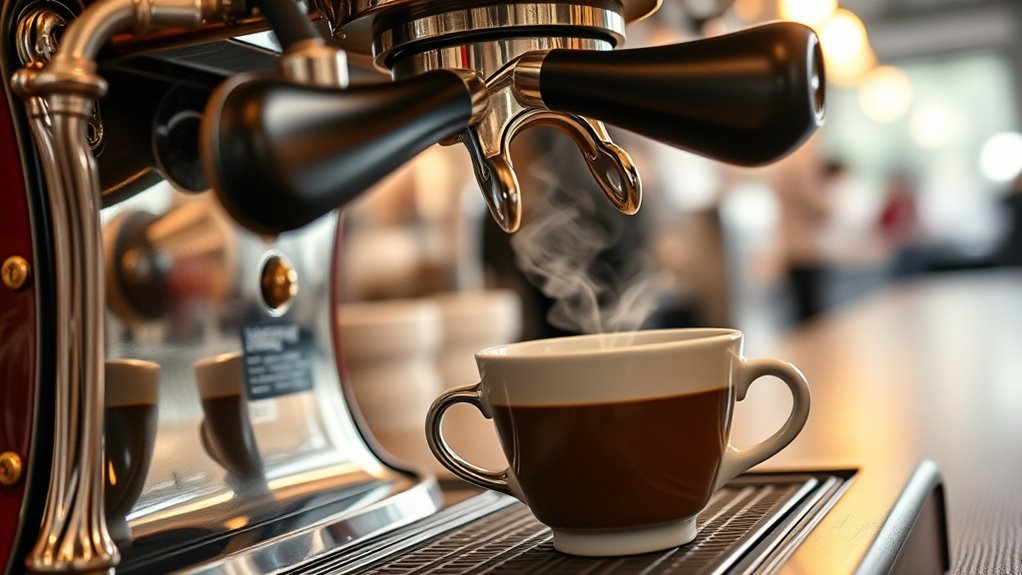The invention of the espresso machine transformed how you enjoy coffee by making quick, rich, and aromatic shots accessible to everyone. It shifted coffee from a simple necessity to an art form, inspiring new brewing techniques and social scenes at cafes. This innovation elevated coffee culture, encouraging craftsmanship at home and work, and sparked endless variations like lattes and cappuccinos. If you want to discover how this device changed everything, keep exploring its fascinating history and influence.
Key Takeaways
- The espresso machine introduced pressure-based brewing, unlocking rich, complex flavors and elevating coffee from a simple beverage to an art form.
- It revolutionized coffee culture by creating new drink varieties like lattes and cappuccinos, fostering social and café scenes worldwide.
- Compact espresso machines enabled high-quality home brewing, transforming coffee into a personal craft and hobby.
- The device shifted traditional brewing methods, emphasizing precision, consistency, and technical skill in coffee preparation.
- Espresso machines contributed to a global lifestyle shift, blending sophistication, speed, and appreciation for coffee craftsmanship.

The invention of espresso revolutionized how coffee lovers enjoy their favorite beverage. This small, concentrated shot of coffee transformed the coffee culture worldwide, introducing a new way to appreciate rich flavors and bold aromas. Before espresso machines became widespread, brewing techniques were more limited, often involving drip methods or simple percolators. Espresso changed all that by offering a quick, efficient way to extract intense, complex flavors from finely ground coffee. It became a symbol of sophistication and innovation, shaping the way people think about coffee.
Espresso transformed coffee culture with its rich flavors, quick extraction, and symbol of innovation and sophistication.
As you explore the world of coffee, you’ll notice that espresso’s emergence pushed baristas and enthusiasts to refine their brewing techniques. Instead of relying on traditional methods, they adopted pressure-based brewing, which involves forcing hot water through compacted coffee grounds at high pressure. This process pulls out more oils and flavors than other techniques, resulting in a thicker, more aromatic shot. The invention of espresso machines made it possible for even small cafes to serve high-quality coffee consistently, encouraging a shift in the coffee culture from simple morning routines to an art form. It’s no longer just about caffeine intake; it’s about appreciating craftsmanship, precision, and flavor complexity. Specialized equipment like espresso machines has played a crucial role in elevating the quality and consistency of coffee.
This innovation also influenced how coffee is enjoyed socially. Espresso bars and cafes sprang up everywhere, becoming hubs for social interaction, conversation, and even creative expression. People began to appreciate the nuances of different beans, roasts, and brewing styles, elevating coffee from a daily necessity to an experience worth savoring. The development of espresso machines also inspired countless variations like cappuccinos, lattes, and macchiatos, each built around that core shot of espresso. These beverages now define modern coffee culture, blending artistry with technical skill.
You’ll find that espresso’s influence extends beyond the café. Home brewing techniques have evolved with the availability of compact espresso machines, allowing you to craft high-quality coffee in your own kitchen. The precision involved in pulling a perfect shot has made coffee brewing a hobby and a craft, encouraging experimentation and mastery. Over time, espresso has become synonymous with a fast-paced, sophisticated lifestyle, but it also invites you to slow down and appreciate the intricacies of flavor and aroma. The invention of espresso didn’t just change how you make coffee—it transformed your entire experience of coffee, creating a global culture centered on quality, technique, and shared enjoyment. Espresso machines have become essential tools for elevating your home coffee experience.
Frequently Asked Questions
How Did Espresso Influence Global Coffee Culture?
You see, espresso revolutionized global coffee culture by shaping new coffee rituals and inspiring urban cafes worldwide. Its rich, concentrated flavor became a symbol of sophistication, encouraging people to savor their coffee moments. You’re likely to find espresso-based drinks in bustling cafes, where it fuels social interactions and daily routines. This powerful brew transformed coffee from simple refreshment into an art form, making it central to modern urban lifestyles everywhere.
What Technological Advancements Improved Espresso Machines Over Time?
You’ll see that technological advancements greatly improved espresso machines over time. Innovations like pressure profiling, which allows precise control of brew techniques, enhance flavor extraction. Machine innovations such as PID temperature control and improved boiler designs guarantee consistent results. These advancements make it easier for you to craft high-quality espresso shots at home or in cafes, elevating your coffee experience and refining the art of brewing.
Who Were the Key Inventors Behind the First Espresso Machine?
You might be surprised to learn that the key inventors behind the first espresso machine include Angelo Moriondo, who patented an early version in 1884, and Desiderio Pavoni, who improved it in 1905. Their innovations laid the groundwork for modern espresso. As a barista, mastering techniques and creating espresso art relies on understanding these origins, helping you appreciate the machine’s evolution and craft better coffee experiences.
How Has Espresso Impacted Coffee Farming and Production?
Imagine a vibrant mosaic of coffee beans, each telling a story of change. Espresso’s rise has pushed you to refine harvesting techniques, seeking the perfect bean for that rich shot. This demand fuels sustainable farming, shaping how farmers cultivate and select coffee beans. You see a shift from traditional methods to innovative practices, blending tradition with technology, all inspired by the desire for bold, aromatic espresso that energizes your morning.
What Are the Environmental Effects of Modern Espresso Machine Manufacturing?
You might not realize it, but modern espresso machine manufacturing affects the environment through energy consumption and the use of sustainable materials. These machines often require significant power, contributing to carbon emissions, but many brands now focus on reducing energy use. Choosing models made with sustainable materials helps lessen environmental impact. By being mindful of energy consumption and supporting eco-friendly manufacturing, you can enjoy your espresso while helping protect the planet.
Conclusion
You see, the invention of the espresso machine revolutionized coffee culture, turning a simple brew into an art form. It’s like a master painter’s brush, transforming raw ingredients into a rich, complex masterpiece. Without it, your morning would lack that bold, aromatic kick that energizes your day. This device didn’t just change how you drink coffee—it elevated the entire experience, making every cup a small work of art you enthusiastically anticipate.









